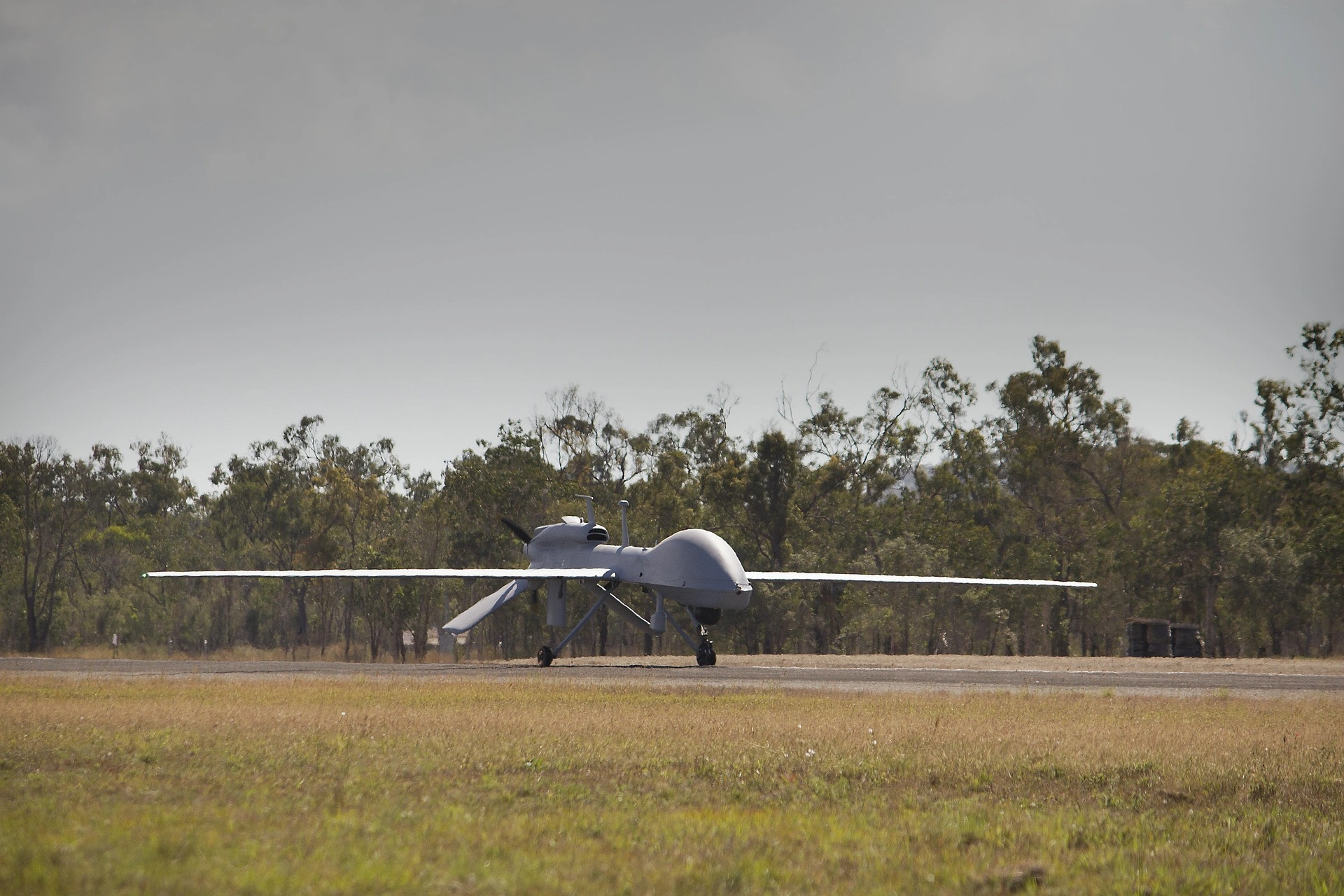Huge Navy drone has pirates and poachers in its sights

John E. Kaye

A pirate and poacher-hunting drone that can fly without a crew for 90 days using only the energy from the sun has made a “true, world-changing first” test flight in the US
The Skydweller, which has a wingspan greater than a Boeing 747, took off and landed from Stennis International Airport (HSA) in Mississippi without “humans on-board or in control”.
A fleet of the aircraft will be deployed for long duration “national security” missions, which could include covert surveillance and reconnaissance flights over the South China Sea and above other “challenging” hot spots around the world.
They will also be used to detect pirates and drug smugglers at sea, and big game poachers in Africa.
The drones, which are reportedly being developed for the US Navy, can cruise at 100 knots and remain airborne – at altitudes of up to 45,000 feet – for months at a time.
Nearly 3,000 square feet of photovoltaic cells on their giant, carbon fibre wings provide continuous power and zero carbon emissions.
By contrast, current combustion-powered aircraft, including piloted planes and drones, are limited to a maximum of around 40 hours flight time.
Skydweller Aero, the US manufacturer, said this makes their aircraft between 10 and 100 times cheaper to operate than conventional planes.
Speaking this week, its CEO Robert Miller said: “This is a true, world-changing first in the aerospace industry.
“Our fleet of uncrewed aircraft will enable a multitude of long-duration missions that support national security and non-terrestrial communications with revolutionary cost savings.
The Skydweller builds on the manned Solar Impulse 2 aircraft that flew around the world in 2015 and 2016 but had to stop every five days.
Its latest, upgraded version will reportedly eliminate the cockpit, allowing space for hardware that allows for autonomous abilities.
In a statement, Skydweller Aero said the drone will also feature a 5G communications relay, sophisticated video and surveillance facilities, satellite communication, and imaging radar.
It can also carry an 800-pound payload.
The statement added: “Autonomous aircraft directly save lives by removing the need for flight crews to be physically present in hostile or dangerous airspace.
“For example, a Skydweller aircraft can take off from the United States, fly itself to the South China Sea, and stay in the air on mission for weeks or months before returning home.
“Additionally, autonomy enables not just traditional long-duration missions, but also new missions that would have formerly been deemed unacceptable due to risk to the flight crew.
“Skydwellers can be deployed for long-duration missions such as providing continuous aerial overage above conflict zones, surveilling naval activity in contested waters without risking pilots’ lives, detecting drug smugglers and pirates at sea, and tracking wildlife migration and poaching in Africa.”
Miller added: “We are applying cutting-edge, 21st century materials science, artificial intelligence, and software development to an industry that has spent more than 100 years building piloted, combustion-based aircraft.
“This allows Skydweller to leap ahead of heritage aircraft manufacturers in terms of aircraft performance, flight duration, and cost effectiveness.”
Further information
www.skydweller.aero
Images © Skydweller
RECENT ARTICLES
-
 Europe’s leading defence powers launch joint drone and autonomous systems programme
Europe’s leading defence powers launch joint drone and autonomous systems programme -
 Euro-zone business activity accelerates as manufacturing returns to expansion
Euro-zone business activity accelerates as manufacturing returns to expansion -
 Deepfake celebrity ads drive new wave of investment scams
Deepfake celebrity ads drive new wave of investment scams -
 WATCH: Red Bull pilot lands plane on moving freight train in aviation first
WATCH: Red Bull pilot lands plane on moving freight train in aviation first -
 Europe eyes Australia-style social media crackdown for children
Europe eyes Australia-style social media crackdown for children -
 These European hotels have just been named Five-Star in Forbes Travel Guide’s 2026 awards
These European hotels have just been named Five-Star in Forbes Travel Guide’s 2026 awards -
 McDonald’s Valentine’s ‘McNugget Caviar’ giveaway sells out within minutes
McDonald’s Valentine’s ‘McNugget Caviar’ giveaway sells out within minutes -
 Europe opens NanoIC pilot line to design the computer chips of the 2030s
Europe opens NanoIC pilot line to design the computer chips of the 2030s -
 Zanzibar’s tourism boom ‘exposes new investment opportunities beyond hotels’
Zanzibar’s tourism boom ‘exposes new investment opportunities beyond hotels’ -
 Gen Z set to make up 34% of global workforce by 2034, new report says
Gen Z set to make up 34% of global workforce by 2034, new report says -
 The ideas and discoveries reshaping our future: Science Matters Volume 3, out now
The ideas and discoveries reshaping our future: Science Matters Volume 3, out now -
 Lasers finally unlock mystery of Charles Darwin’s specimen jars
Lasers finally unlock mystery of Charles Darwin’s specimen jars -
 Strong ESG records help firms take R&D global, study finds
Strong ESG records help firms take R&D global, study finds -
 European Commission issues new cancer prevention guidance as EU records 2.7m cases in a year
European Commission issues new cancer prevention guidance as EU records 2.7m cases in a year -
 Artemis II set to carry astronauts around the Moon for first time in 50 years
Artemis II set to carry astronauts around the Moon for first time in 50 years -
 Meet the AI-powered robot that can sort, load and run your laundry on its own
Meet the AI-powered robot that can sort, load and run your laundry on its own -
 Wingsuit skydivers blast through world’s tallest hotel at 124mph in Dubai stunt
Wingsuit skydivers blast through world’s tallest hotel at 124mph in Dubai stunt -
 Centrum Air to launch first European route with Tashkent–Frankfurt flights
Centrum Air to launch first European route with Tashkent–Frankfurt flights -
 UK organisations still falling short on GDPR compliance, benchmark report finds
UK organisations still falling short on GDPR compliance, benchmark report finds -
 Stanley Johnson appears on Ugandan national television during visit highlighting wildlife and conservation ties
Stanley Johnson appears on Ugandan national television during visit highlighting wildlife and conservation ties -
 Anniversary marks first civilian voyage to Antarctica 60 years ago
Anniversary marks first civilian voyage to Antarctica 60 years ago -
 Etihad ranked world’s safest airline for 2026
Etihad ranked world’s safest airline for 2026 -
 Read it here: Asset Management Matters — new supplement out now
Read it here: Asset Management Matters — new supplement out now -
 Breakthroughs that change how we understand health, biology and risk: the new Science Matters supplement is out now
Breakthroughs that change how we understand health, biology and risk: the new Science Matters supplement is out now -
 The new Residence & Citizenship Planning supplement: out now
The new Residence & Citizenship Planning supplement: out now



























